Help! Why Does My Baby’s Breath Smell Like Sour Milk?
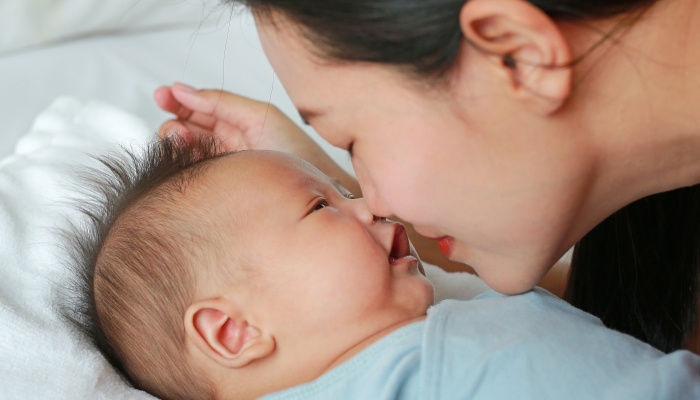
There is nothing quite like snuggling up with a newborn baby. It’s hard to resist their soft skin, squeezable cheeks, and newborn baby smell. Who can resist snuggling right up to those sweet baby faces? You might be shocked when you hold your baby close and notice that their breath smells sour.
Bad breath in adults is usually caused by poor dental hygiene or food particles stuck in the mouth. It’s easily fixed by brushing teeth more often or using mouthwash. While the cause of bad breath in adults is usually clear, the cause of a baby’s bad breath is not always so obvious.
Before you can fix your baby’s bad breath, you’ll need to figure out why your baby’s breath smells like sour milk in the first place.
Why Baby’s Breath Might Smell Like Sour Milk
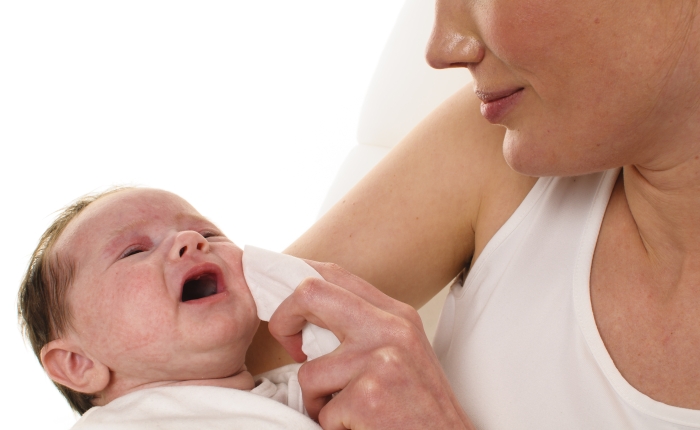
Your baby’s bad breath may have several different causes, and most of them are easy to fix.
Leftover Milk in the Mouth
If your baby has milk left in their mouth, they may end up with milk tongue. While not serious, milk being left in the mouth to sit on the tongue can cause bad breath. Babies with tongue ties or a high palate are more likely to have leftover milk in their mouths.
Oral Thrush
Oral thrush is common in babies and is caused by an overgrowth of fungus in the mouth. It’s often passed back and forth between a breastfeeding mother and her baby. According to the Mayo Clinic11. Mayo Foundation for Medical Education and Research. Oral thrush. Mayo Clinic. 2021. https://www.mayoclinic.org/diseases-conditions/oral-thrush/symptoms-causes/syc-20353533, signs and symptoms of oral thrush include a white film developing on the tongue, redness or soreness in the mouth, cracking and redness around the corners of the mouth, and a sour milk smell.
If your baby’s breath smells like sour milk and they’re exhibiting other signs of oral thrush, it’s important to seek treatment right away. While thrush is not serious for most babies, you want to avoid passing it back and forth, especially if you’re breastfeeding.
Acid Reflux
Bad breath in both babies and adults can sometimes be caused by acid reflux. While it’s normal for all babies to spit up, bad breath caused by acid reflux may be more serious. When stomach acids repeatedly come up through your baby’s esophagus, it can cause worse problems than just bad breath.
Babies with severe gastroesophageal reflux disease (GERD) may often cry in pain, have trouble gaining weight, develop teeth problems, and have bad breath.
Sinus Infection
If your baby has bad breath, it might be caused by an underlying issue like a sinus infection. This is because bacteria trapped inside your baby’s nasal cavity can cause foul breath.
Sinus infections aren’t usually serious and often resolve on their own. Even though they aren’t life-threatening, sinus infections can be uncomfortable for your child.
Chronic sinusitis can be caused by nasal obstruction, tooth decay, respiratory infection, and gastroesophageal reflux.
Experts at Johns Hopkins Medicine22. Sinusitis in Children. Johns Hopkins Medicine. 2022. https://www.hopkinsmedicine.org/health/conditions-and-diseases/sinusitis-in-children state that warning signs of a sinus infection in children include runny nose, persistent cough, and swelling around the eyes.
Poor Oral Hygiene
Even if there are no teeth in your baby’s mouth, they can still have bad breath caused by poor oral hygiene. Odor problems caused by bad hygiene often get worse as children get older.
It’s rare, but babies can develop gum disease before they get their first tooth. Babies with conditions like Down syndrome33. Reuland-Bosma, W., & Dijk, J.. Periodontal disease in Down’s syndrome: A Review. Journal of Clinical Periodontology. 1986;13(1), 64–73. https://doi.org/10.1111/j.1600-051x.1986.tb01416.x are more likely to develop gum disease at a young age.
Understanding Your Baby’s Breath

As a parent, you probably spend a lot of time worrying about your child’s health and development. It’s easier to figure out what can be done about your baby’s bad breath if you have a solid understanding of infant oral health.
Infant Oral Health
According to the National Institute of Dental and Craniofacial Research44. Oral Health in America: Advances and Challenges [Internet]. Bethesda (MD): National Institute of Dental and Craniofacial Research(US). 1986;2021 Dec. Section 2A, Oral Health Across the Lifespan: Children. https://www.ncbi.nlm.nih.gov/books/NBK578299, cavities affect nearly 1 in four young children. This makes cavities and tooth decay the most common oral problem in young children. Problems like cavities, tooth decay, and gingivitis are primarily due to dry mouth, an inconsistent oral hygiene routine, and a poor diet.
Most children don’t get their first tooth until they’re around 6 months old but have their full set of 20 teeth by age three. In rare cases, infants can be born with a tooth or two. No matter when your baby starts to get teeth, good oral hygiene is imperative.
How Should A Baby’s Breath Normally Smell?
Normally, a baby’s breath smells fresh and clean or slightly sweet. You may notice that your baby’s mouth smells more sweet after a feeding. This is due to the sugars in the milk that they drink.
How to Improve Your Baby’s Oral Health
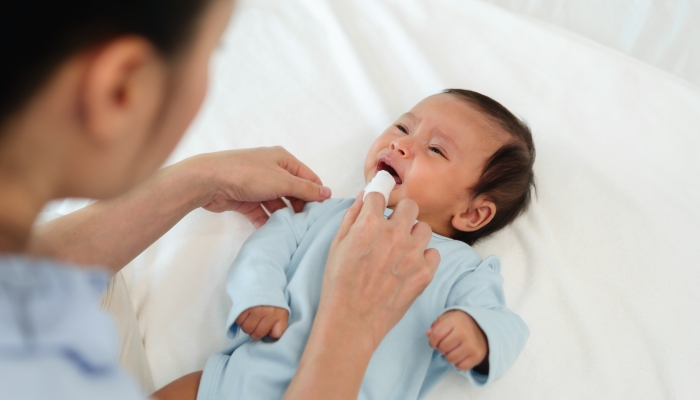
Because oral health is so important, you might start feeling stressed about whether or not you are doing enough to keep your baby’s mouth clean. Luckily, infant oral hygiene is actually pretty simple.
Cleaning Your Baby’s Mouth
You can start building good habits with your baby as soon as you bring them home from the hospital. Just like adults, babies and children should have their mouths cleaned after they eat and anytime they spit up or throw up.
To clean your newborn’s gums, you don’t need any special products or even toothpaste. You can simply use a warm, wet washcloth to gently wipe their mouth and gums as needed.
When your child gets a little older, you can introduce child-friendly training toothpaste and a soft toothbrush. Let your child practice brushing their own teeth, and then help them get to the hard-to-reach places. Don’t forget to scrub the tongue!
Feeding Practices
Once your baby is old enough to hold their own bottle, it’s tempting to let them fall asleep drinking it. Bottles in cribs sometimes feel like the only way for an exhausted parent to manage bedtime.
Sadly, nighttime bottles often lead to a condition known as bottle rot. Experts Sujata Tungare and Arati G. Paranjpe state in the study Early Childhood Caries55. Tungare, S., & Paranjpe, A. G.. Early Childhood Caries. National Library of Medicine: StatPearls Publishing LLC. 2023. https://www.ncbi.nlm.nih.gov/books/NBK535349 that this condition can lead to mouth pain, difficulty eating, and trouble with talking. Restricting feedings to daytime only is important for promoting healthy teeth throughout childhood.
Preventing or treating acid reflux is another way to keep your baby from oral health problems and bad breath. If you can, hold your baby upright for thirty minutes after each meal, and make sure to burp them well after every bottle or breastfeeding session.
As your child starts eating solid foods, avoiding added sugars, consuming water instead of juice, and consuming fluoride become important guidelines to follow.
Regular Check-ups
Your baby should start seeing a dentist by the time they are about one year old. Having regular dentist checkups and professional cleanings helps prevent cavities and gum diseases.
In addition to regular dentist checkups, your child should be seen by a pediatrician at scheduled intervals. Pediatricians can help diagnose and treat oral problems that cause sour smell and figure out if any underlying conditions may be contributing to the problem. The American Academy of Pediatrics66. American Academy of Pediatrics. AAP Schedule of Well-Child Care Visits. HealthyChildren.org. 2023. https://www.healthychildren.org/English/family-life/health-management/Pages/Well-Child-Care-A-Check-Up-for-Success.aspx#:~:text=The%20Bright%20Futures%20%2FAmerican%20Academy%20of%20Pediatrics%20%28AAP%29,at%20each%20well-child%20visit%20from%20infancy%20through%20adolescence recommends that your child be seen at:
- 3 to 5 days old
- 1 month
- 2 months
- 4 months
- 6 months
- 9 months
- 12 months
- 15 months
- 18 months
- 2 years
- 2.5 years
- Yearly after that
When to Seek Medical Help
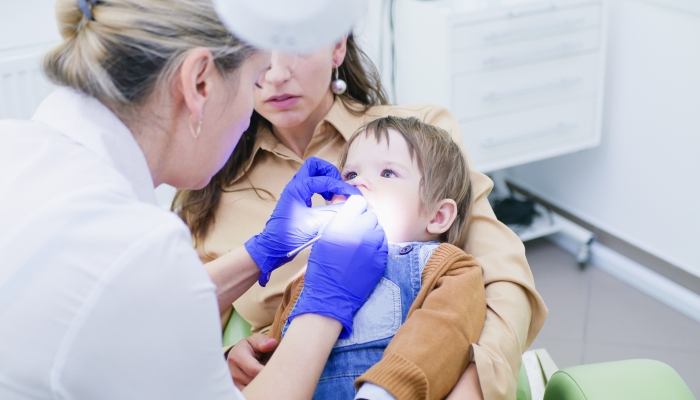
Usually, bad breath in babies is only a mild problem and is easily fixable. Most problems with sour-smelling breath can be solved by cleaning the mouth and gums with a washcloth.
If your baby’s bad breath is a constant problem, their breath has a fishy smell, or they seem to have mouth pain, it might be time to seek medical attention.
Other signs that warrant a call to your child’s pediatrician include:
- Refusal to eat or drink
- White coating on the tongue
- Open sores or bleeding in the mouth
- Problems gaining weight
- Crying when spitting up
- Cracked or dry lips
- Dry mouth
- Severe congestion or runny nose
Whenever you are worried about the health of your baby, you can call your pediatrician for advice. It may be helpful to write down what your baby’s breath smells like along with other symptoms so your child’s doctor has enough information to make a plan for your baby’s health.
FAQs
Is a sour milk smell in a baby’s breath more common in breastfed or formula-fed babies?
Since a sour milk smell is more about oral hygiene than the type of milk your baby drinks, there is no reason to believe that sour breath is more common with certain types of feeding. However, allowing your baby to fall asleep with a bottle does put them at a higher risk of dental issues.
Are there any preventive measures to avoid oral thrush?
Oral thrush can be hard to get rid of, especially when a breastfeeding mother and her baby pass it back and forth between one another. In order to prevent or treat oral thrush, you should wash your own and your baby’s hands frequently, sterilize bottles and pacifiers after each use, and see your healthcare provider right away if you think you need medical treatment.
How should I clean pacifiers or teething toys to prevent sour-smelling breath in my baby?
Pacifiers, bottle nipples, nipple shields, and teething toys should be sterilized after each use in order to protect your baby from bacteria, yeast, and fungus that likes to grow in moist environments. You can use a dishwasher set to the sterilize setting or use a specially designed baby product made for sterilizing. Alternatively, you can boil your items to sterilize them.
References
- Mayo Foundation for Medical Education and Research. (2021, April 23). Oral thrush. Mayo Clinic. https://www.mayoclinic.org/diseases-conditions/oral-thrush/symptoms-causes/syc-20353533
- Sinusitis in Children. Johns Hopkins Medicine. (2022, April 12). https://www.hopkinsmedicine.org/health/conditions-and-diseases/sinusitis-in-children
- Reuland-Bosma, W., & Dijk, J. (1986). Periodontal disease in Down’s syndrome: A Review. Journal of Clinical Periodontology, 13(1), 64–73. https://doi.org/10.1111/j.1600-051x.1986.tb01416.x
- Oral Health in America: Advances and Challenges [Internet]. Bethesda (MD): National Institute of Dental and Craniofacial Research(US); 2021 Dec. Section 2A, Oral Health Across the Lifespan: Children. https://www.ncbi.nlm.nih.gov/books/NBK578299
- Tungare, S., & Paranjpe, A. G. (2023, January). Early Childhood Caries. National Library of Medicine. https://www.ncbi.nlm.nih.gov/books/NBK535349
- American Academy of Pediatrics. (2023, July 24). AAP Schedule of Well-Child Care Visits. HealthyChildren.org. https://www.healthychildren.org/English/family-life/health-management/Pages/Well-Child-Care-A-Check-Up-for-Success.aspx#:~:text=The%20Bright%20Futures%20%2FAmerican%20Academy%20of%20Pediatrics%20%28AAP%29,at%20each%20well-child%20visit%20from%20infancy%20through%20adolescence
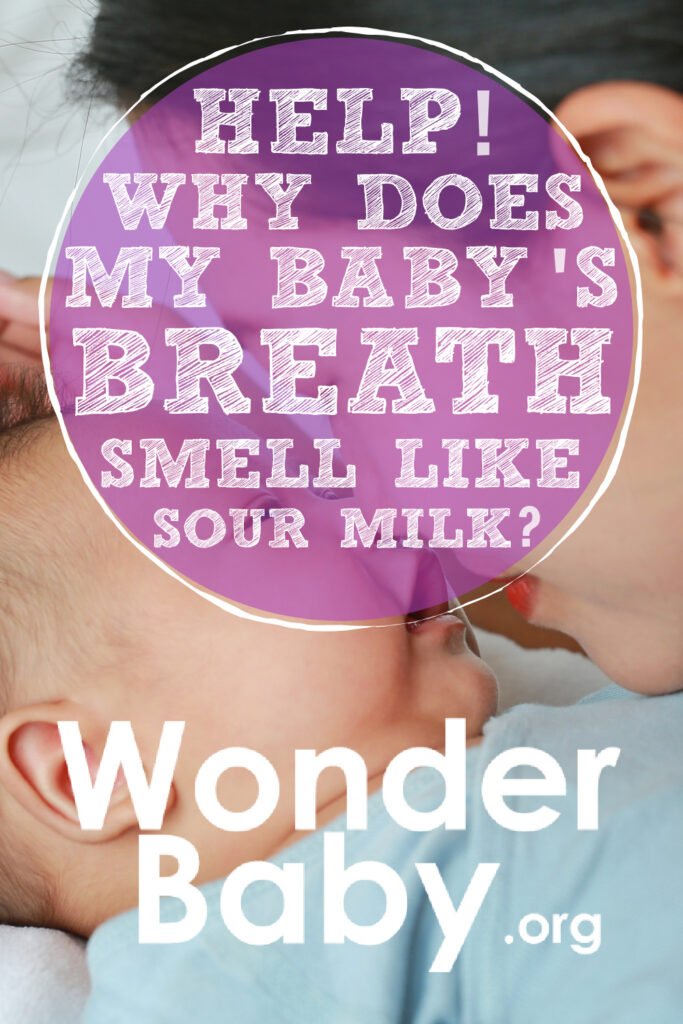
The information WonderBaby provides is not intended to be, and does not constitute, medical or other health advice or diagnosis and should not be used as such. Always consult with a qualified medical professional about your specific circumstances.
Related Posts

Eye Conditions and Syndromes, Visual Impairment
Neuralink Announces Plans to Restore Sight to the Blind with Brain Chip
Elon Musk’s company Neuralink has announced plans to begin human trials of its new “Blindsight” brain chip by the end of 2025.

Health & Nutrition
Can Baby Skin Care Products Expire?
Is that forgotten tube of diaper rash cream still safe to use? Learn more about the expiration dates of popular skin care products for infants.

Health & Nutrition
Boosting Immunity in Kids: 3 Tips for a Healthy Winter
Parents can help boost their kids’ immunity during cold and flu season by maintaining healthy eating, sleeping, and exercising habits in the winter.